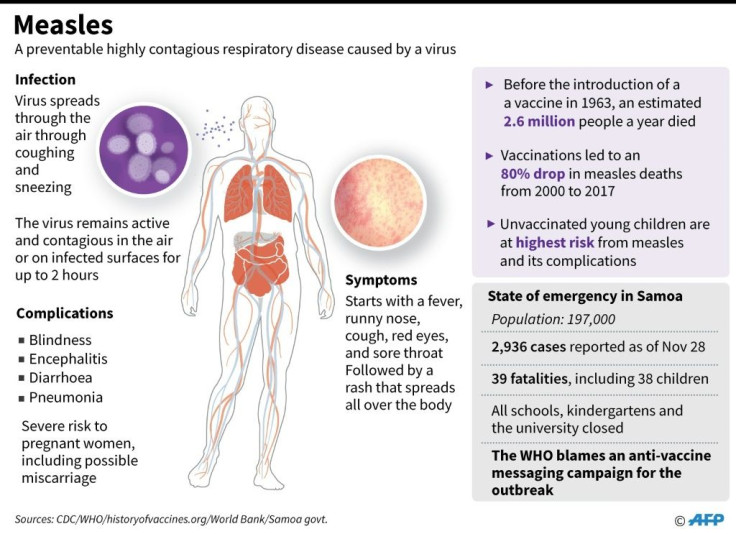Fears For Infants In Samoa As Measles Deaths Mount

Measles infections continued to climb steeply in Samoa Thursday as a mass vaccination programme fails to reach the infants most vulnerable to the deadly epidemic.
The government said the number of fatalities had climbed to 39 and the total number of infections was 2,936, up 250 in a 24-hour period.
Infants aged four or less account for 35 of the deaths since the outbreak began in mid-October and the government said another 21 children were critically ill in hospital.
Yet the Pacific nation's director of health Take Naseri said a compulsory vaccination programme was not reaching children aged six months to four years, even though they are a priority group.
"We are still not satisfied with the coverage of the six months to the four years. We still haven't crossed 40 percent of that age group," he told reporters Wednesday.
"The other age groups are doing steadily, but we are still worried that most of the kids are not coming forward or not being brought by their parents."
The World Health Organization has blamed an anti-vaccine messaging campaign for leaving Samoa vulnerable to the spread of the virus.

New Zealand nurse Karen Page, who is in Samoa with the Red Cross, said the vaccination programme had been popular in urban areas and mobile clinics were now moving out into the countryside.
But she said the programme had been complicated by the fact that measles had a long incubation period, when people with the virus could spread it while showing no outward symptoms themselves.
"People are likely to (appear) quite well and be spreading the infection around unknowingly," she told Radio New Zealand.
"So you've got this time lag and the numbers will go up and then you'll see the curve and hopefully it won't be much longer before the numbers start coming down again."
The first case was diagnosed more than seven weeks ago and Page said overstretched health workers were feeling the strain.
"The hospital staff have been here working long, long shifts every day since all this started," she said.
"It's really traumatic for them because they're seeing a lot of sadness and a lot of death. You can imagine what it's like for the families."
© Copyright AFP {{Year}}. All rights reserved.





















